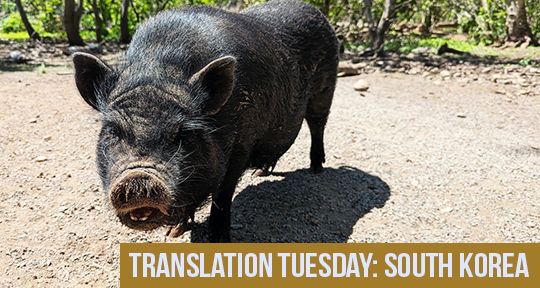A quotidian tale of a young man and his sow in the idyllic Korean countryside is not all that it seems. Translator Young-Ji Kang captures the disquieting undertones that pervade Yi Hyosŏk’s writing, as we learn of our main character’s growing discontent with his little Puni and Little Sow. This Translation Tuesday, become a spectator to the breeding grounds, meander through the market, and follow the railroad tracks.
The ruins of a fortress wall, a willow crowned by a magpie nest, a squat beryl blue sky. Below, a hutch containing a rabbit that in color is white but whose huddled form and spiky fur give it the appearance of a hedgehog. The onshore wind sweeps over the fields, tickling the crab-apples before swirling through the barley field where the breeding grounds still sit under a layer of snow, to buffet the pigsties.
Beside the pigsties, exposed to the wind and squealing at the top of its lungs, a sow is tethered, each splayed leg to a stake. Around those four stakes stalks the stud boar, its livid maw frothing, and then up go its front legs and it mounts. The sow, resembling a turtle pinned beneath a dark boulder, shrieks and wiggles frantically, dislodging the boar. Ever ready, the boar begins stalking again. From the sties all around comes the squealing and bellowing of mating pigs—it’s a raucous afternoon at the breeding grounds.
A crowd has gathered to cheer on the boar, but after witnessing half an hour of wasted effort, they begin to stir. And then one last time the boar comes crashing down on the sow—the stakes snap clean off, and the sow manages to slip free and scamper off.
“Poor little runt,” chuckles one of the breeding-grounds handlers. “Like trying to mate a hen with a bull—it’s unnatural, I tell ya.”
“Yeah,” says a farmer. “She must have had the scare of her life.” So saying, the farmer goes out behind the pigsty and corners the sow.
“I had her serviced here last month, I guess it was, but nothing happened,” says Shigi, the color rising on his face. “So here we are again.”
“Even animals have to be old enough to know better, but your sow’s still way too young.”
At the farmer’s words, Shigi gets even more red in the face. “Goddamn animal!” he mutters.
And if that were not enough, the annoying beast has broken free and is once againrunning loose. Humiliated, Shigi flares up and gives chase, the farmer close behind. One of Shigi’s rubber shoes comes off in the muck and his pants begin to slide down.
At last he manages to grab the tether circling the sow’s midsection and out of pique yanks it hard, bringing the sow up short. He whips the animal furiously with the tether, and the young sow wiggles and jumps every which way, squealing all the while. Yes, he will surely feel remorseful later on for lashing the pitiful beast, the family’s lifeline for the farm year in that the proceeds from its sale will cover their first tax payment of the year as well as keeping them stocked with provisions until the early-summer potato harvest. But losing face in front of the stand of onlookers is too much for him to bear, and he takes out his anger on the pathetic animal.
“C’mon, let’s give it another try.” After re-setting the stakes and ramming them in, the farmer beckons Shigi.
This time, Shigi and the farmer tether the terror-stricken creature to the stakes all the more securely, then position the wooden lever beneath the sow’s belly so that it’s suspended in air and can’t budge.
Shigi feels the boar’s hairy body as it squirms and paces, and then the moment he steps back, the boar charges the sow like a piston on a coal-fired locomotive, a lusty bellow issuing from its crimson maw. At the throat-rending squeals of the helpless sow, the onlookers’ laughter is stilled—for the moment their jokes are forgotten.
The image of Puni flits through Shigi’s mind and he looks away.




